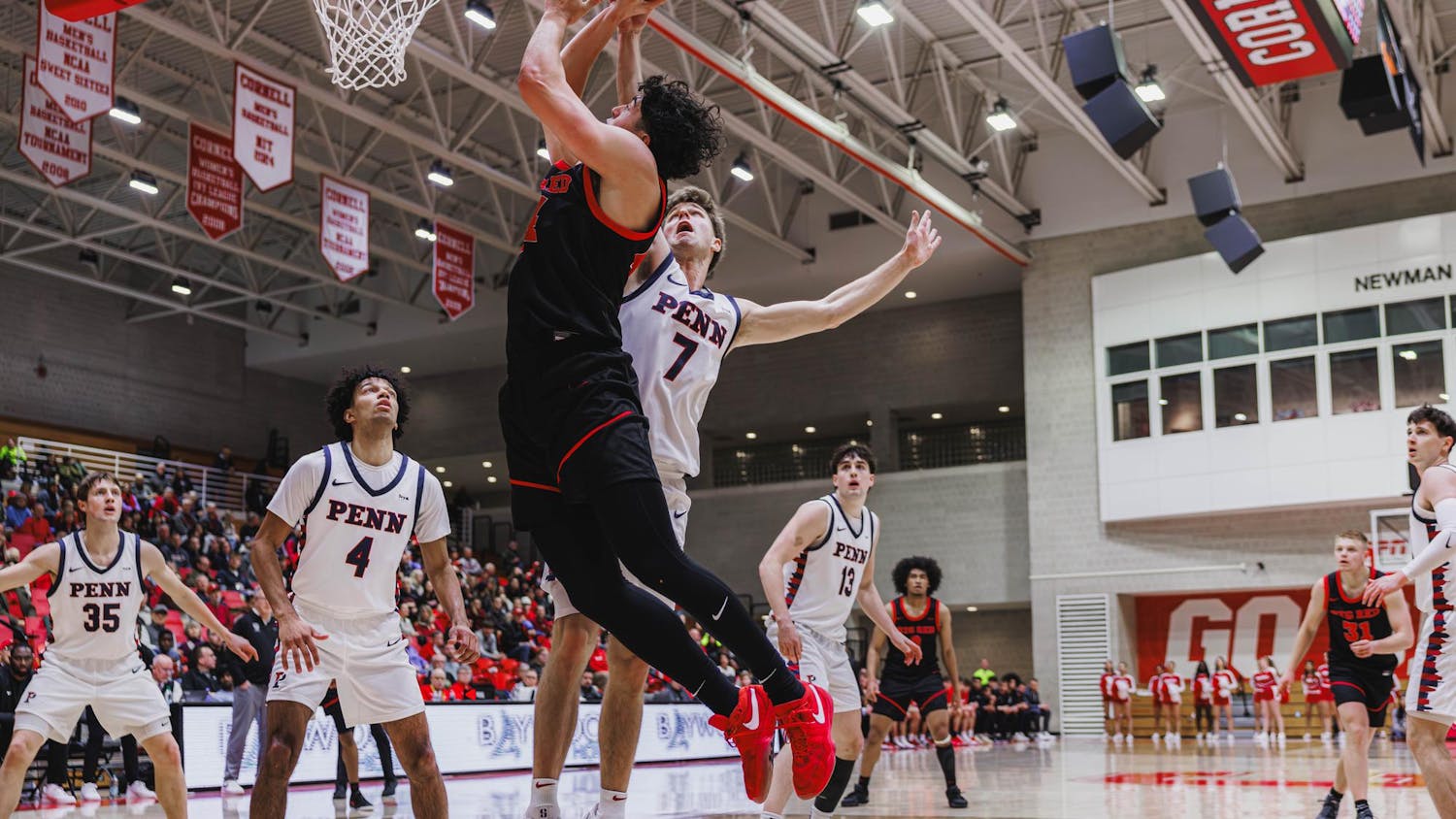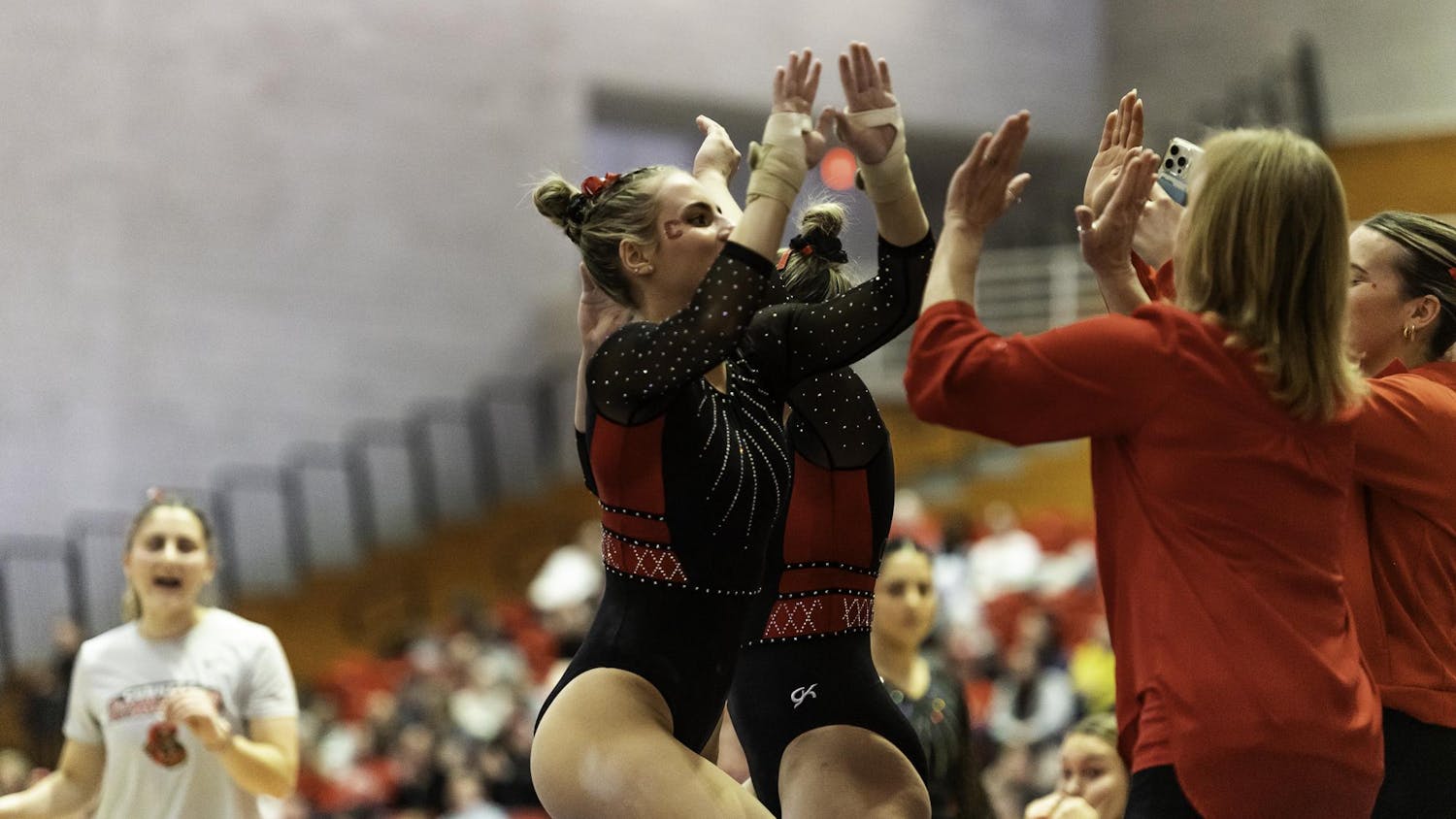Two months ago, four freshmen met for the first time. 50 days later, they are rowing champions.
Merrick Word-Brown ’28, Peter Mueller ’28, Aiden Parsa ’28 and Alex Slezak ’28 joined Cornell Rowing Club with a combined zero years of rowing experience. But on Oct. 26, the four frosh represented CRC at The Head of The Fish Regatta in Saratoga Springs, New York, beating out multiple Division-I and Division-III schools en route to gold.
Completing the 3.2K race in 13:35.68, CRC outpaced 10 competitors despite facing headwind conditions.
So how did these four manage to go from zero to hero in 50 days? How did they develop championship chemistry? The Sun spoke to the four freshmen to learn the secrets to their success.
Slezak hails from San Francisco. Outside of his classes as a public policy major, Slezak is the president of Hu Shih Hall. The first time he rowed he fell in love — the unison of the boat, the feathering, the sounds, and every other small detail in rowing. Slezak sits as the stroke of the boat, with his job being to set the rowing pace.
“CRC has cultivated a winning culture for us,” Slezak said. “I think when I met Merrick, Aiden and Peter, our goals and competitive spirits really aligned with that culture.”
The team has a rigorous schedule — training on the ergometer, remaining conditioned in the gym, watching film and practicing technique on the water. They try their best to imitate the top athletes of rowing. On top of that, they had to learn everything else that came with rowing — maintaining the boat, using the correct terminology to communicate in the boat, practicing proper technique and literally managing to stay afloat together.
“It's really an addiction,” Word-Brown said. “Every day after practice we analyze film, [and] we work on making adjustments that will lead to bigger improvements down the road.”
Word-Brown is a global and public health major at the College of Human Ecology. On top of rowing, he is a member of the Cornell Cycling Club and a writer for The Cornell Healthcare Review. He started pursuing rowing because of its similarities to cycling.
Mueller studies agricultural science in the College of Agricultural and Life Sciences. He began rowing after members of the varsity team encouraged him to try it. Mueller is an Upstate New York native and said his greatest athletic achievement was winning this regatta.
The four have developed a couple of traditions they believe have delivered their success. They hold team dinners, during which they discuss tactics, watch film and set a positive mindset for their practice. They also analyze technique videos against their own film, identifying one area of improvement to bring to the boat. Their favorite sources for these videos? Instagram reels.
“It’s been really fun just finding people that are motivated and really push me to be the best rower possible,” Parsa said. “We all hold each other responsible, and the friendships I’ve made go beyond just rowing.”
Hailing from Rome, Georgia, Parsa is an economics major in the College of Arts and Sciences. Parsa was directly introduced to rowing by Slezak and has not looked back since. The challenges Parsa faces as he strives to improve keep him hooked.
Getting to the boathouse itself is its own challenge — the four typically travel about a mile off campus via bike on a winding and uphill road. Interestingly, they enjoy this trek to practice, which they say is an opportunity to prepare physically and mentally for the practice ahead.
Despite the team’s clear passion, there are still points of frustration. With only four official practices before the regatta, the team struggled to balance learning an entirely new sport with race technique. The four constantly mixed with other members of the rowing club and never truly had the opportunity to just row together.
“Two practices before the race, we struggled keeping the boat at a good pace,” Slezak said.
The night before the race, the four met up at Parsa’s dorm in Mary Donlon Hall. They spent time watching inspirational rowing videos and discussing race strategy. The entire time, their mindset was that this race was theirs to win.
“Something clicked on race day and I think it was just all of the passion and work that we’ve poured in,” Slezak said.
Another key part of the boat’s success is the coxswain, whose job is to navigate the boat and lead the rowers through motivation and specific direction. The four have worked with two different coxswains — Joseph McMahon ’26 and Carolina Guerrero-Gomez ’26 — which has provided an interesting aspect to their training.
“Whether the coxswain is Joe or Carolina, we as a team emphasize communication — telling them what we want to hear and what helps,” Parsa said. “The coxswain is very important to our chemistry, and we are lucky enough to have Joe and Carolina.”
Guerrero-Gomez was the coxswain during the competition. She utilized her communication skills and experience to steer the boat in the winding conditions of the race.
McMahon is new to being a coxswain and works with the four during practice. McMahon’s chemistry with the four and passion for rowing have helped him garner success with the club.
“The people I met rowing — those connections really keep you going when you have a tough practice,” Mueller said. “The challenge and just recognizing that we can get better through resilience is important to us.”
Before the race, coach Becca Jeffries had the team doing a challenging drill –– with their eyes closed, the quad would have to remain in sync as she randomly changed the stroke rate of the boat. To her surprise, they remained in rhythm.
“I have never seen a crew able to do that in all my years in the sport,” Jeffries said.
On the day of the regatta, the chemistry and practice that the quad had been putting in manifested.
“It was surreal and incredibly fulfilling,” Parsa said. “We have not been rowing as long as those guys, but I can guarantee you that we have put an amount of work into the sport,” Parsa said.
It was an incredibly emotional and close race for the club. They beat the University of Massachusetts — a Division-I school — by four seconds.
“I honestly cried when I found out. It was surreal,” Jeffries said. “What puts them over the edge is that they work really really hard. … They are always asking for extra training. They are always erging together on days they don’t have practice. They are incredibly dedicated and have a super strong connection together.”
While the team recognizes the work they put into making this win happen, they acknowledge their coach as essential to their success.
Jeffries started coaching last year. Her rowing journey started her freshman year of high school. For Jeffries, coaching has been very rewarding because she is able to involve herself in her favorite sport from a different angle. Whenever she is making decisions for the club, she likes to recall the wisdom of her high school coaches.
“Becca is really dedicated to our progress. From the stroke to the bow, she chose to help us and we are all incredibly grateful to her,” Slezak said. “The win would not have been possible without her and Carolina.”
Following the win, the team plans to take on a new set of challenges heading into the winter season. From decreasing their ergometer times to honing in on technique, CRC is excited to tackle the new season head-on, ramping up fundraising efforts to provide the teams with new equipment and uniforms.
“For me, I see each day as a new chance for me to pick something and improve on it, so when we get back to the water, we are ready to go,” Mueller said.
Each member of the unit is now locked into the winter preparation segment of the year.
“I am definitely not going easy on them now because they won,” Jeffries said.
Zeinab Faraj is a member of the class of 2028 in the College of Arts and Sciences. She is the features editor on the 143rd Editorial Board and was the assistant sports editor of the 143rd Editorial Board. You can reach her at zfaraj@cornellsun.com.











